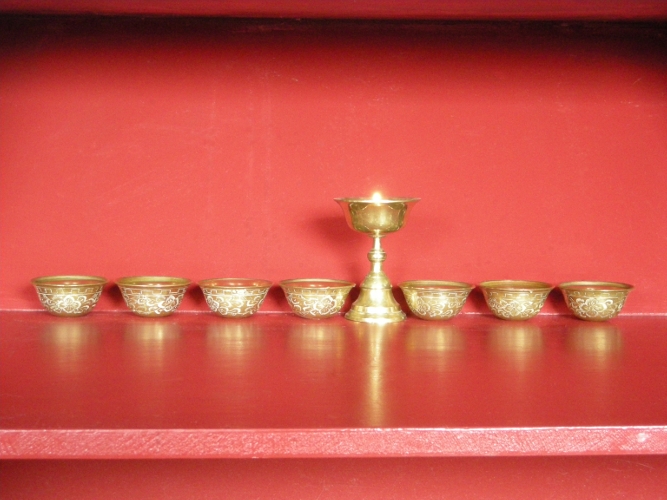
Offering bowls
symbols of communication
Many Buddhist practitioners set up offerings bowls every day on a personal shrine. The bowls may be filled with water or rice.
Ngakma Nor’dzin comments: Ngakpa ’ö-Dzin and I were taught how to set up water bowl shrine offerings by Gétsulma Tsultrim Zangmo at the Lam Rim Buddhist Centre. She explained that the bowls should be filled generously, but not overfilled – just as you would fill a cup with tea to offer to a guest. You would wish the cup to be full enough to offer a full measure to your guest, but not so full that they could not pick up the cup without spilling the liquid.
The traditional offerings are reminiscent of ancient Indian culture. If one received an honoured guest into one’s home you would offer them food and drink and the facility to wash away the dust of the road; you may place a garland of flowers around their neck and anoint them with perfumed oil; you would have prepared your home to receive them, and have lit incense and arranged pleasant music to be played. Such offerings are communicative: of your wish for your guest to be comfortable and enjoy their stay with you, and of the value you place on their visit. Your guest’s appreciative awareness of your consideration and acceptance of the offerings sets the scene for the establishment of your relationship. It was not part of Tibetan culture to offer water to wash the feet of your guest, but the symbolic offering remains part of the Buddhist tradition in Tibet, to honour the ancient origins of the tradition and to make a connection with it.
Offerings are also part of twenty-first century culture. If we are invited to someone’s home for dinner we will take a bottle of wine – we do not turn up empty handed. This is a symbolic ritual – we are not suggesting that our host will not have provided wine for the meal, cannot afford to buy wine, or will provide inferior wine to that which we supply. We do not take a bottle of wine because we believe we need to help out our hosts. The wine is an everyday symbol – we are saying that we like our hosts and are glad to be invited for dinner. The gift is a communication. It expresses that we are there with good intent, and have made an effort, and offer a symbol of our connection with our hosts and appreciation of their invitation.
Shrine offerings are not really being offered to anyone – the yidam / lama is not actually drinking it, or actually being benefitted by it, but it is a symbol of our connection. It is a symbol of our wish to have a connection with the yidam / lama.
